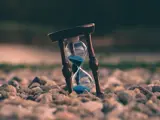Only compare yourself to... yourself.
Year-end Stats and the Comparison Trap
As house music producers and artists this is the time of year when we look at what we have (or haven’t) accomplished over the past year and celebrate our “wins” with others. It’s a great time to practice gratitude for what we have accomplished and to renew our commitment to our future artistry. At the same time, there is risk that we end up comparing our stats to others on some level and then valuing our worth based on what we’ve accomplished compared to our distorted perception of others’ success.
In the past I have fallen into the comparison trap, but over the past couple of years I’ve have made some mindset shifts to prevent myself from going down those darker paths. I’m still human and occasionally find myself in that head space, but I’ve made a lot of progress. I thought I’d jot down some thoughts about my mindset around this topic.
How do YOU measure “success”?
There are so many ways that we could measure success or growth. A lot of those are vanity metrics, but our definition of success is specific to us individually. There are ways we grow that can’t be easily measured: things like personal growth, mindset shifts, productivity, etc. And lots of artists release great music without their music getting heard; the vanity metrics aren’t a reflection of how high the quality of a given track is or how much a fan has connected with a song.
For the things we can measure, we really have very little control over our results. We can only control the activities that we think will help us reach the results we are targeting. So when we set specific targets, it’s in our best interest to create a system for how we intend to achieve the goals. Then periodically we can measure our success based on how well we followed our plan and the steps.
For example, if one of our goals is to reach a certain number of plays on Spotify – we really can’t control the number of plays/streams, but we can make a plan to 1) shop our demos to labels that have a great Spotify presence, 2) pitch our releases to playlist curators, and 3) ask our audiences to save specific tracks to their playlists. Those are all activities that we have control over, and that system of activities is what we should be tracking for ourselves.
Another thought: as music producers we are making art; our works are unique creations that no one else will ever make. Our music connects to each in person in a unique way, and that connection is impossible to measure. Each creation is its own baseline, so comparing track stats will never be “apples to apples” comparisons.
To be clear, I’m not trying to pretend that I don’t set goals. I definitely set goals (some of them are likely out of reach in the timeframe I’ve defined), but then I work backwards from those goals to create habits and plans that I can track. I’m not perfect at this, but I’ve been feeling liberated by tracking my success based on adherence to the habits I strive to practice rather than on specific results. If habits aren’t working, it’s time to look at adjusting the habits or pivoting in some area.
The Comparison Trap
We are our only competition, and our past and present self is the only person we should be comparing ourselves to, but it’s human nature to look to others for inspiration, and we all model others on some level. One of the risks of looking at what others are doing is that we are only seeing a very limited snapshot. We don’t see all the work they are putting in behind the scenes, the relationships they nurture, or any other advantages that they might have.
There is no way that we can accurately compare our “success” with someone else’s when we don’t have all of the information. We might look at someone else’s outward success as a benchmark and then evaluate ourselves based on a completely distorted perception of reality – and that has the potential to cause mental health issues if not kept in check.
If we find ourselves slipping into that comparison trap, it’s critical that we are in tune with our own purpose (our “why”). When we are clear on our values-based vision, we can set goals that are aligned with that vision of our artistry. When we don’t have a clear vision for our artistry, that’s when we end up looking to others for cues as to what we should be doing and falling into the comparison trap (again, often based on false or incomplete perspective).
Looking Ahead
As I plan for 2022, my goals will be driven by the habits I want to create, and I’ll do my best to keep emotionally letting go of the results. I’m also excited about continuing a personal growth journey and connecting more with my community (hint: if you’re reading this, you are my community). I mean… what are we doing music for if the ultimate goal isn’t to connect with others?



